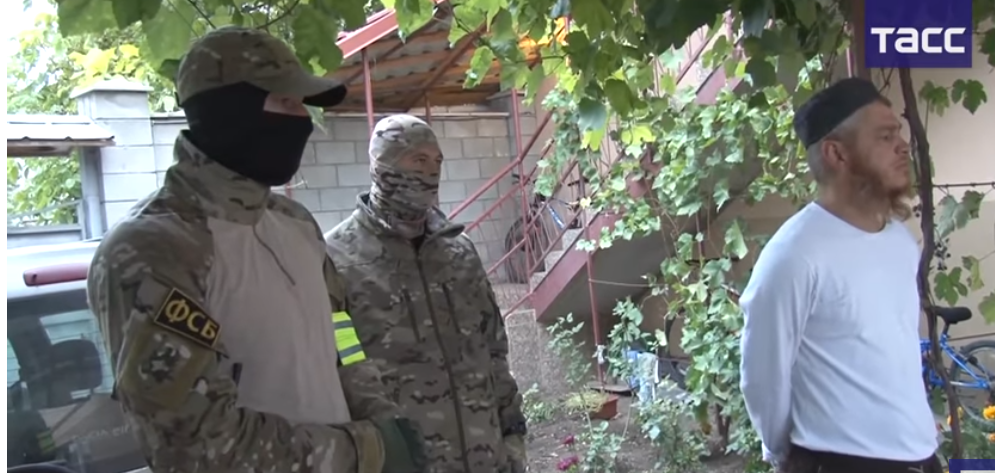• Topics / Human Rights Abuses in Russian-occupied Crimea
5-year sentence demanded in Russia’s “safari hunt of Muslims” in occupied Crimea

The de facto prosecutor in Russian-occupied Crimea has demanded one real five-year prison term and three suspended sentences in its prosecution of four Crimean Muslims for membership of the entirely peaceful and apolitical Tablighi Jamaat missionary movement.
Since annexing Crimea, Russia has increasingly persecuted Muslims on spurious ‘extremism’ or ‘terrorism’ grounds for alleged involvement in movements which are legal in Ukraine. In reporting the arrest of the four men back in 2017, Said Ismagilov, Head of the Spiritual Directorate of Muslims in Ukraine, suggested that the occupation regime was “hunting Muslims in Crimea like on safari”.
49-year-old Rinat Suleymanov; 65-year-old Talyat Abdurakhmanov; Arsen Kubedinov (44) and Seiran Mustafaev (50) were subjected to armed searches and arrested on 2 October 2017. Russian state-controlled media, citing a member of the occupation regime, claimed that three “cells” of Tablighi Jamaat had been “eliminated”.
The use made of such arrests by Russian propaganda are just one of the features that link these arrests on supposed ‘Tablighi Jamaat’ charges with other arrests over alleged involvement in ‘Hizb ut-Tahrir’. None of the men in any of these cases, nor the two movements themselves, have ever committed any crime, and the charges are based solely on Russian Supreme Court decisions labelling Tablighi Jamaat ‘extremist’ and Hizb ut-Tahrir ‘terrorist’. According to RIA Novosti, the Russian Supreme Court asserted that Tablighi Jamaat’s activities were aimed at “violating Russia’s territorial integrity and discriminating against citizens of Russia on religious grounds, as well as showing support for international terrorist organizations”. There is nothing to suggest that any evidence was provided to support such claims.
At least in occupied Crimea, there are also major differences, mostly linked with the criminal charges that follow from the Supreme Court’s arbitrary designation of these movements. Men accused of involvement in Tablighi Jamaat are charged under Article 282.2 of Russia’s criminal code.- ‘organization of an extremist society’. The harshest sentence under this article is from 6 to 10 years’ imprisonment. This is already draconian, but considerably less than the sentences handed down for unproven involvement in Hizb ut-Tahrir (up to life imprisonment), although the ‘evidence’ focuses solely on claims of involvement in either Tablighi Jamaat or Hizb ut-Tahrir.
The other difference was evident from the outset, with Aider Ismailov, Deputy Head of the Muftiat, which is collaborating with the occupation regime, reportedly agreeing to help the men, but only if they rejected ‘biased’ lawyers and accepted ‘guilt’.
Abdurakhmanov, Kubedinov and Suleymanov were initially remanded in custody, while Mustafaev, the only one who had a state-appointed lawyer, was placed under house arrest.
In November 2017, Abdurakhmanov was released, seemingly because of health problems. In February 2018, Kubedinov was also released, leaving only Suleymanov in custody. The men were obviously under great pressure to accept the charges, and very little was known about the case until well after the ‘trial’ began.
Suleymanov and Abdurakhmanov deny the charges against them, while both Kubedinov and Mustafaev have pleaded ‘guilty’. It should be stressed that none of the men denies membership of Tablighi Jamaat which, as said, is legal in Ukraine.
During the fourth hearing on 10 January 2019, Suleymanov was questioned and stated that he had only learned that followers of Tablighi Jamaat were regarded as ‘extremists’ who support terrorist organizations after his arrest. While acknowledging his link with Tablighi Jamaat, he stressed several times that he did not support either extremist or terrorist methods.
The only ‘proof’ provided by the prosecution comes from an illicitly taped meeting and a dubious linguistic ‘expert assessment’ of this. During the hearing, Suleymanov asked the court to pay close heed to this, and said that he and others consciously never discuss politics and try to avoid national or other features of different ethnic groups which can divide different people.
He called the linguistic assessment “manipulative” aimed at confirming the ‘extremist’ charges, while also pointing to at least 10 primitively ignorant mistakes.
The application to summon this supposed expert appears to have been rejected.
During the hearing on 16 January, the prosecutor demanded guilty sentences for all four men, though a real prison sentence only for Suleymanov. He did not especially conceal the reason, since the main ‘extenuating’ circumstance in the case of the other men was that they had cooperated with the investigators. He claimed that Suleymanov had created “a cell of the international extremist organization Tablighi Jamaat, active in Simferopol and the Simferopol region”. He called him “the communicative leader” and asked for a five-year sentence in a medium security prison colony, with a further 2-year restriction in activities. For Abdurakhmanov, Kubedinov and Mustafaev, he asked for a 4 year suspended sentence, with a probation term of 3 years.
The men are due to give their final address on 21 January.





